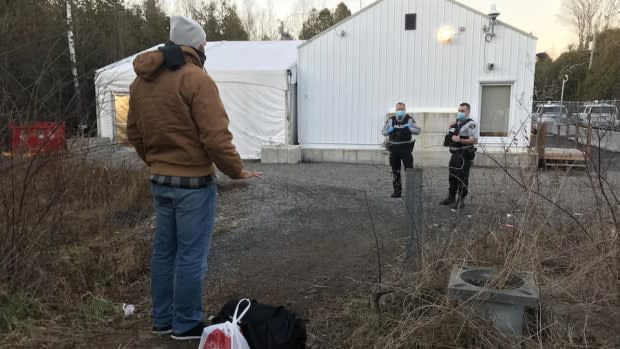More and more migrants entering province being sent elsewhere, Quebec immigration minister claims

Almost all the asylum seekers who entered Canada through Roxham Road last weekend were sent elsewhere in the country, according to Quebec's immigration minister — and Christine Fréchette says she's hopeful that will become the norm moving forward.
In a brief meeting with reporters on Thursday afternoon, Fréchette said that out of about 380 people who set foot in Quebec, only eight stayed in the province. The others were redirected to other parts of Canada, mainly Ontario.
Fréchette said it's a sign that Ottawa is finally listening to the Quebec government's concerns about the flow of asylum seekers coming into the province through the irregular border crossing.
"We're very happy about this," Fréchette said. "We hope that this will be maintained and that this will be the new approach to managing the borders and asylum seekers."
The minister said she could not provide details about how the asylum seekers are being transported to other parts of Canada. Her spokesperson later told CBC News that the federal government has set aside hundreds of hotel rooms.
On Parliament Hill, a reporter informed Ahmed Hussen, Canada's federal minister of diversity and inclusion, of Fréchette's comments.
Hussen was asked if what happened at the border this past weekend represented some sort of shift in how the influx of asylum seekers would be handled.
He downplayed the notion. "No, it happened in the past," said Hussen.
"There's co-ordination among the different provinces," he said. "It depends on what services are available at that time and people are redirected the services that are available."
Last year, about 40,000 people seeking asylum in Canada entered the country through Roxham Road. That number represents roughly 42 per cent of applicants in 2022.

Legault writes letter to NYC, meets with U.S. ambassador
Fréchette's announcement comes as the premier of Quebec seeks dialogue with officials in the U.S. about the challenges at the border.
François Legault is urging the mayor of New York City to stop helping asylum seekers make their way to Roxham Road, an irregular border crossing where people can walk from the U.S. into Quebec.
In a recent letter obtained by Radio-Canada, Legault asked Mayor Eric Adams to "immediately" put an end to "all forms of assistance" to people that cross the border where it is "strictly forbidden."
Last week, a spokesperson for the mayor's office confirmed that the city is providing free bus tickets to people who want to reach Plattsburgh, N.Y., which is about 30 minutes away from Roxham Road.
The spokesperson for New York City said it is facing an "unprecedented" migrant crisis that has overwhelmed its resources.
"We understand that the siuation of migrants in New York presents major challenges, but the situation in Quebec, specifically in Montreal, is excessively difficult," Legault's letter reads.
On Tuesday, Legault met with David Cohen, the U.S. ambassador to Canada. During the meeting, the premier stressed the need to modify the Safe Third Country Agreement.
The agreement, signed in 2002 between Canada and the United States, means that migrants must submit their asylum application in the first of the two countries they enter and cannot try a second time at an official border crossing.
It does not apply to irregular border crossings. That's why people who enter Canada through Roxham Road cannot be turned away.
Legault said he told the ambassador that he wants the agreement to apply all border crossings, even irregular ones.
"I told him that I don't understand that it takes this long to settle [this] with the United States," the premier said.


